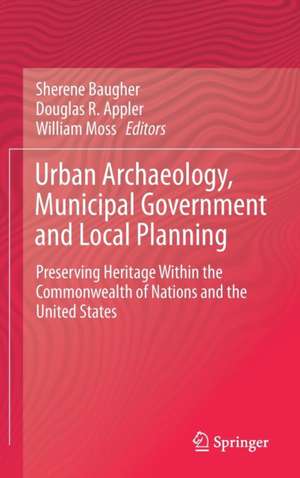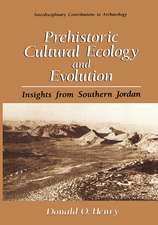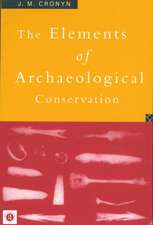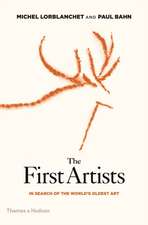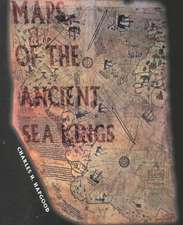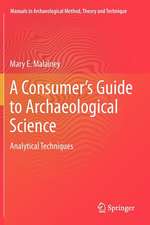Urban Archaeology, Municipal Government and Local Planning: Preserving Heritage within the Commonwealth of Nations and the United States
Editat de Sherene Baugher, Douglas R. Appler, William Mossen Limba Engleză Hardback – 6 aug 2017
This book will explore the experiences, both positive and negative, of small and large cities globally. We have examined programs in the Commonwealth of Nations (formerly known as the British Commonwealth) and in the United States. These countries share similar perspectives on preservation and heritage, although the approaches these cities have taken to address municipal archaeology reveals considerable diversity. The case studies highlight how these innovative partnerships have developed, and explain how they function within local government. Engaging with the political sphere to advocate for and conduct archaeology requires creativity, flexibility, and the ability to develop collaborative partnerships. How these archaeological partnerships benefit the community is a vital part of the equation. Heritage and tourist benefits are discussed. Economic challenges during downturns in the economy are analyzed. The book also examines public outreach programs and the grassroots efforts to protect and preserve a community's archaeological heritage.
| Toate formatele și edițiile | Preț | Express |
|---|---|---|
| Paperback (1) | 687.96 lei 38-44 zile | |
| Springer International Publishing – 2 aug 2018 | 687.96 lei 38-44 zile | |
| Hardback (1) | 789.98 lei 43-57 zile | |
| Springer International Publishing – 6 aug 2017 | 789.98 lei 43-57 zile |
Preț: 789.98 lei
Preț vechi: 963.39 lei
-18% Nou
Puncte Express: 1185
Preț estimativ în valută:
151.16€ • 158.25$ • 125.08£
151.16€ • 158.25$ • 125.08£
Carte tipărită la comandă
Livrare economică 07-21 aprilie
Preluare comenzi: 021 569.72.76
Specificații
ISBN-13: 9783319554884
ISBN-10: 3319554883
Pagini: 464
Ilustrații: VIII, 345 p. 85 illus., 73 illus. in color.
Dimensiuni: 155 x 235 x 26 mm
Greutate: 0.67 kg
Ediția:1st ed. 2017
Editura: Springer International Publishing
Colecția Springer
Locul publicării:Cham, Switzerland
ISBN-10: 3319554883
Pagini: 464
Ilustrații: VIII, 345 p. 85 illus., 73 illus. in color.
Dimensiuni: 155 x 235 x 26 mm
Greutate: 0.67 kg
Ediția:1st ed. 2017
Editura: Springer International Publishing
Colecția Springer
Locul publicării:Cham, Switzerland
Cuprins
1. Thinking Globally, Acting Locally: Exploring the Relationships Between Community, Archaeological Heritage and Local Government.- Part I: The Challenges and Accomplishments of Local Government Archaeology Programs in the Commonwealth of Nations.- 2. Planning Archaeology in World Cities: Looking at London.- 3. Preservation, Participation, and the Pursuit of Knowledge: Strategic Policy and Archaeological Practice within the City of York 1989 to 2015.- 4. Crowdsourcing the Story of Bristol.- 5. Archaeological Resource Management in Toronto: Planning, Preservation and Interpretation.- 6. Under the Old Stones of Kingston, Ontario: The City of Kingston Archaeological Master Planning Process (2005-2011).- 7. Québec City’s Archaeological Program and Provincial Cultural Heritage Legislation.- 8. Archaeology Down Under: Management and Outcomes in the First State in Australia.- 9. From Alliance to Dissonance: Two Centuries of Local Archaeology and Conservation in Indian Cities. The Case of Lucknow, India.- Part II: The Challenges and Accomplishments of Local Government Archaeology Programs in the United States.- 10. Towards a Theory of Municipal Archaeology: Why Local Government Should Become Public Archaeology’s New Best Friend.- 11. We Dig Alexandria: A Reflection on More Than Fifty Years of Community Archaeology.- 12. Reflections on the New York City Archaeology Program (1980-2016).- 13. Digging the Hub: The Evolution of the City of Boston Archaeology Program.- 14. Phoenix Rising: The Development of a Municipal Archaeology Program in Arizona, USA.- 15. Municipal Archaeology Policies as a Vector in Public Outreach Programs: Digging Up Dirt for the Masses in St. Augustine, Florida.- 16. Like No Other Place: Albuquerque’s Archaeological Odyssey.
Notă biografică
Sherene Baugher, Ph.D., was the first City Archaeologist for New York City (1980-1990). Since 1991, she has been a professor at Cornell University affiliated with Cornell’s Departments of Landscape Architecture, City and Regional Planning, and the Cornell Institute of Archaeology and Material Studies. Her research on class, ethnicity, gender, and inequality focuses on 18th and 19th century sites with a special focus on New York sites. She has co-edited two other books for Springer, Archaeology and Preservation of Gendered Landscapes (2010) and Past Meets Present: Archaeologists Partnering with Museum Curators, Teachers, and Community Groups (2007).Douglas R. Appler, Ph.D., AICP, is an Assistant Professor in the Department of Historic Preservation at the University of Kentucky. He is a former practicing city planner whose research emphasizes innovation in the relationship between local government and historic resources. He received his Ph.D. in City and Regional Planning from Cornell University, and is a member of the American Institute of Certified Planners.
William Moss coordinates municipal archæological heritage management for the City of Québec, a UNESCO World Heritage site. He was appointed Chief Archaeologist, the first position of its kind in Canada, in 1985. More than two hundred projects carried out under his supervision have generated an important body of knowledge that has been widely communicated to the city’s inhabitants, as well as contributing to the conservation and development of numerous sites. Laval University¸ where Mr. Moss is a sessional lecturer, awarded him an honorary Ph.D. for his contribution to the knowledge of, the protection and the development of Québec City’s rich archæological heritage.
William Moss coordinates municipal archæological heritage management for the City of Québec, a UNESCO World Heritage site. He was appointed Chief Archaeologist, the first position of its kind in Canada, in 1985. More than two hundred projects carried out under his supervision have generated an important body of knowledge that has been widely communicated to the city’s inhabitants, as well as contributing to the conservation and development of numerous sites. Laval University¸ where Mr. Moss is a sessional lecturer, awarded him an honorary Ph.D. for his contribution to the knowledge of, the protection and the development of Québec City’s rich archæological heritage.
Textul de pe ultima copertă
Improving the relationship between archaeology and local government represents one of the next great challenges facing archaeology –specifically archaeology done in urban settings. Not only does local government have access to powerful legal tools and policy mechanisms that can offer protection for privately owned archaeological sites, but because local government exists at the grassroots level, it is also often closer to people who have deep knowledge about the community itself, about its values, and about the local meaning of the sites most in need of protection. This partnership between archaeology and local government can also provide visibility and public programing for heritage sites.
This book will explore the experiences, both positive and negative, of small and large cities globally. We have examined programs in the Commonwealth of Nations (formerly known as the British Commonwealth) and in the United States. These countries share similar perspectives on preservation and heritage, although the approaches these cities have taken to address municipal archaeology reveals considerable diversity. The case studies highlight how these innovative partnerships have developed, and explain how they function within local government. Engaging with the political sphere to advocate for and conduct archaeology requires creativity, flexibility, and the ability to develop collaborative partnerships. How these archaeological partnerships benefit the community is a vital part of the equation. Heritage and tourist benefits are discussed. Economic challenges during downturns in the economy are analyzed. The book also examines public outreach programs and the grassroots efforts to protect and preserve a community's archaeological heritage.
This book will explore the experiences, both positive and negative, of small and large cities globally. We have examined programs in the Commonwealth of Nations (formerly known as the British Commonwealth) and in the United States. These countries share similar perspectives on preservation and heritage, although the approaches these cities have taken to address municipal archaeology reveals considerable diversity. The case studies highlight how these innovative partnerships have developed, and explain how they function within local government. Engaging with the political sphere to advocate for and conduct archaeology requires creativity, flexibility, and the ability to develop collaborative partnerships. How these archaeological partnerships benefit the community is a vital part of the equation. Heritage and tourist benefits are discussed. Economic challenges during downturns in the economy are analyzed. The book also examines public outreach programs and the grassroots efforts to protect and preserve a community's archaeological heritage.
Caracteristici
Provides numerous examples of excavations in global cities
Evaluates the legal, political and community involvement in establishing and transforming municipal archaeology programs
Addresses the public benefits of archaeology, preservation and heritage tourism
Includes supplementary material: sn.pub/extras
Evaluates the legal, political and community involvement in establishing and transforming municipal archaeology programs
Addresses the public benefits of archaeology, preservation and heritage tourism
Includes supplementary material: sn.pub/extras
